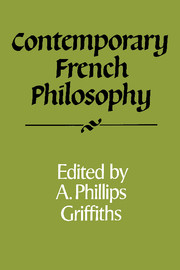Book contents
- Frontmatter
- Contents
- Preface
- Continental Insularity: Contemporary French Analytical Philosophy
- The Misprision of Pragmatics: Conceptions of Language in Contemporary French Philosophy
- Ants and Women, or Philosophy without Borders
- Motifs towards a Poetics
- The Relevance of Cartesianism
- The Enlightenment without the Critique: A Word on Michel Serres' Philosophy
- The Teleological and Deontological Structures of Action: Aristotle and/or Kant?
- The Crisis of the Post-modern Image
- Merleau-Ponty and the Phenomenology of Perception
- Epistemological History: The Legacy of Bachelard and Canguilhem
- History as Genealogy: An Exploration of Foucault's Approach to History
- Beyond Deconstruction?
- Further Adventures of the Dialectic: Merleau-Ponty, Sartre, Althusser
- Paradoxes of the Pineal: From Descartes to Georges Bataille
- Notes on Contributors
- Index
Paradoxes of the Pineal: From Descartes to Georges Bataille
Published online by Cambridge University Press: 25 May 2010
- Frontmatter
- Contents
- Preface
- Continental Insularity: Contemporary French Analytical Philosophy
- The Misprision of Pragmatics: Conceptions of Language in Contemporary French Philosophy
- Ants and Women, or Philosophy without Borders
- Motifs towards a Poetics
- The Relevance of Cartesianism
- The Enlightenment without the Critique: A Word on Michel Serres' Philosophy
- The Teleological and Deontological Structures of Action: Aristotle and/or Kant?
- The Crisis of the Post-modern Image
- Merleau-Ponty and the Phenomenology of Perception
- Epistemological History: The Legacy of Bachelard and Canguilhem
- History as Genealogy: An Exploration of Foucault's Approach to History
- Beyond Deconstruction?
- Further Adventures of the Dialectic: Merleau-Ponty, Sartre, Althusser
- Paradoxes of the Pineal: From Descartes to Georges Bataille
- Notes on Contributors
- Index
Summary
Illustrious Gentlemen of the Academy!
You do me the honour of requesting that I submit to the academy a report on my earlier life as an ape [mein äffisches Vorleben].
Franz Kafka, Ein Bericht für eine AkademieBehind the third ventricle of the human brain a miniscule pedunculate bud, close to the optic thalamus, that is, to the two beds of optic nerves, a gland soft in substance yet containing gritty particles. Function: unknown. Because of its pine-cone shape it is called the conarium or pineal body, even though the recent photographs of it by Nilsson and Lindberg show it to be morphologically reminiscent of nothing so much as the plucked tail of a gamebird, which Simon Dedalus refers to as ‘the pope's nose’. Today it is presumed to be an endocrine gland of some sort, even though there is no doubt that morphogenetically in all vertebrates it is a vestigial unpaired eye. As fossil evidence indicates—and we still find it almost fully developed in some extant amphibians—ancestral vertebrates possessed in addition to the paired bilateral eyes a solitary dorsal eye opening at the top of the skull to the sky. This singular evagination of the brain—something betwixt a visual organ and a gland—seems to hold a special fascination for philosophers. Here we shall consider two of them: René Descartes (1596–1650), the father, as we say, of modern philosophy; and Georges Bataille (1897–1962), the father, as many say, of post-modern philosophy.
- Type
- Chapter
- Information
- Contemporary French Philosophy , pp. 215 - 228Publisher: Cambridge University PressPrint publication year: 1989

